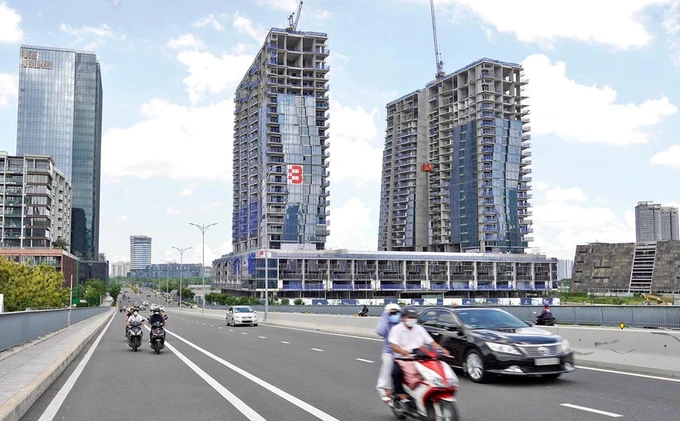Real estate market expected to bloom with introduction of new laws
The 7th session of the 15th National Assembly is considering the Government’s proposal of applying land-related laws 6 months sooner to revive the real estate market.

Chairman Nguyen Van Dinh of the Vietnam Association of Real Estate Brokers (VAREB) commented that the 2024 Land Law, the 2023 Housing Law, and the 2023 Real Estate Business Law are expected to be the foundation for a healthier growth of the real estate market.
The new content in the 2024 Land Law such as direct land handover without bidding for social housing projects or distributing residential land to teachers and medical staff in bordering and remote areas help investors reduce both time and cost when approaching necessary land resources. This will, in turn, increase accommodation supplies for the low-income.
In addition, this Law stipulates cases of land handover via public bidding session to ensure transparency, fair opportunities among investors in accessing land, and selection of the most capable investors for a project to carry out as scheduled.
Another welcome point in this Law is the approval of Vietnamese people permanently settling abroad but still keeping their nationality to have the same land use rights and responsibilities as those living in Vietnam. This helps to increase real estate demands for a more vibrant market in the country.
Meanwhile, the 2023 Real Estate Business Law introduces a quantity of new contents. For instance, real estate brokers must become members of either a formal trading floor or a real estate business. Information about a property must be publicly displayed for trading purposes. Investors of off-the-plan houses can only take 50 percent of the sale contract value before the house is completed. These regulations contribute to eliminating amateur brokers and forming a healthier and more transparent market.
Head of Gia Dinh Law Office Tran Minh Hung shared that the 2023 Real Estate Business Law requires investors of off-the-plan houses to fulfill their financial obligations and other related legal documents before collecting deposits or signing a sale contract with apartment buyers to ensure the rights of both sides in the contract as well as the issuance of apartment ownership certificates in the future.
Also, apartment purchasers can choose not to have a credit guarantee from a credit institution for the investor's financial duties to them, which creates more flexibility and reduce costs for both sides.
The 2023 Housing Law states that when satisfying requirements, residents in mini apartment blocks can receive the apartment ownership right certificate. This allows low-income people to approach accommodation more easily. There is no regulation as to apartment ownership period to develop this housing segment.
This Law adds more subjects greenlighted to invest in, purchase, or rent social housing, which diversifies investment resources and makes social housing policies more practical.
The HCMC Real Estate Association (HoREA) has just sent a proposal to the Prime Minister and the Construction Ministry for the adoption of the 2024 Land Law, the 2023 Housing Law, and the 2023 Real Estate Business Law as well as related laws from July 1, 2024 to aid the recovery and sustainable development of the real estate market.
HoREA presented two scenarios that can affect the national real estate market until the end of the year. The first one is when this market is supported by the approval of the National Assembly to implement the above laws this July instead of the planned date of January 1, 2025. Thanks to this and corresponding decrees, circulars to instruct the implementation, most legal problems of 148 real estates projects in HCMC will be addressed to satisfy both the community and project investors.
In the second scenario, with the planned effective date of the new Laws, the recovery of the real estate market will be 6 months later.
Moreover, if the National Assembly does not greenlight the resolution about piloting the launch of commercial housing projects on land lots not for residential purposes but with a land use right certificate or via a land use right agreement, even with the effective Land Law in the near future, investors are still unable to carry out those projects. This means 15 percent of current commercial housing projects cannot address their legal problems, which might lead to a shortage in commercial housing.
HoREA commented that the weakened or frozen real estate market in the past few years has caused much trouble to real estate businesses, investors, and house buyers. However, the blame is partially on amateur brokers and swing traders. Therefore, real estate enterprises themselves have to be aware of their responsibilities for observing the law and for correcting their weaknesses in operation (investing, capital attracting, constructing, trading) for a more sustainable real estate market.
Statistics from the HCMC Department of Natural Resources and Environment reveal that there are now 200 cases of projects unable to determine specific land prices in HCMC for fulfilling financial duty for the first time or for additional duty due to changes in architectural planning. This has led to the frozen status of hundreds of real estate projects.
In addition, in HCMC, about 80,000 land lots and apartments have not received their certificates because the corresponding land prices are not yet determined for related people to fulfill their financial duty. Successfully addressing the problems for these 80,000 cases will bring a city budget revenue of more than VND80 trillion (US$3.14 billion).








